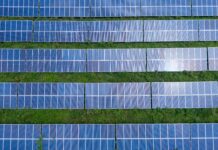Doug Young
![320px-Sunrise_of_Mount_Huang_in_China[1].jpg](http://www.altenergystocks.com/wp-content/uploads/2017/08/320px_Sunrise_of_Mount_Huang_in_China_1_.jpg) Sunrise over Mount Huang in China. |
China’s solar panel industry is starting to look more and more like a beggar kneeling on the doorstep of Beijing, with the latest word that the central government is preparing to hand out an additional $1.1 billion in subsidies to the struggling sector. That news comes just after a government official was quoted saying Beijing is considering a plan to double its already ambitious target for a massive building spree of new solar electricity plants, again in a bid to support the struggling sector.
Shares of embattled solar panel makers many of which are now trading below the $1 mark rallied on this “double happiness” pair of reports, with the healthiest companies notching the biggest gains.Among those, Yingli (NYSE: YGE) posted the biggest gains of about 18 percent, with Trina (NYSE: TSL) and Canadian Solar (Nasdaq: CSIQ) both up around 10 percent. Even Suntech (NYSE: STP) and LDK (NYSE: LDK), 2 of the worst hit companies, notched similar strong gains.
That leads me to my next point, which is that investors expect this latest news to be followed soon by a bigger bailout for the entire sector. Before we look at that part of the bigger picture, let’s step back and have a look at the latest reports, both of which are coming from the official Xinhua news agency that often acts as an informal spokesman for policymakers in Beijing.
According to the reports, China has allocated an additional $1.1 billion in subsidies to the solar sector, more than doubling the amount of previously announced handouts given out this year. (Englsih article) That news comes a day after another Xinhua report quoted a government official saying Beijing is considering a plan to raise its target for construction of new solar power plants to 40 gigawatts of installed capacity by 2015, nearly double the previous target that itself was just raised in September.
It’s interesting that solar shares rallied on the report about new subsidies, since the $1.1 billion in additional support is really quite minor and won’t make a huge difference to any individual company. By comparison, the doubling of the construction target is much bigger and could translate to major new orders not only for the Chinese firms but also for foreign players like First Solar (Nasdaq: FSLR) if Beijing really executes the plan.
My view is that investors are betting that these latest 2 solar signals from Beijing are both just a prelude to a bigger state-led bailout package for the entire industry that is likely to come in the next 3-4 months. That package could see Beijing provide new funding for around a dozen of the industry’s strongest players, which would then act as consolidators for the many smaller producers that would either be closed or merged with bigger rivals.
Investors are clearly becoming optimistic that sunnier days could be ahead for the sector in 2013, fueled by this state-led consolidation and a new boom in demand from China. I would partly agree with this view, though would also caution that there could be some hiccups in implementing such massive new plans. As a result, any meaningful pickup probably won’t come until 2014.
Bottom line: New signals from Beijing indicate a rescue package for solar panel makers is drawing near, though a true turnaround for the sector is unlikely until 2014.
Doug Young has lived and worked in China for 15 years, much of that as a journalist for Reuters, writing about publicly listed Chinese companies. He currently lives in Shanghai where he teaches financial journalism at a leading local university. He also writes daily on his blog, Young’s China Business Blog, commenting on the latest developments at Chinese companies listed in the US, China and Hong Kong. He is also the author of an upcoming book about the media in China, The Party Line: How The Media Dictates Public Opinion in Modern China .






